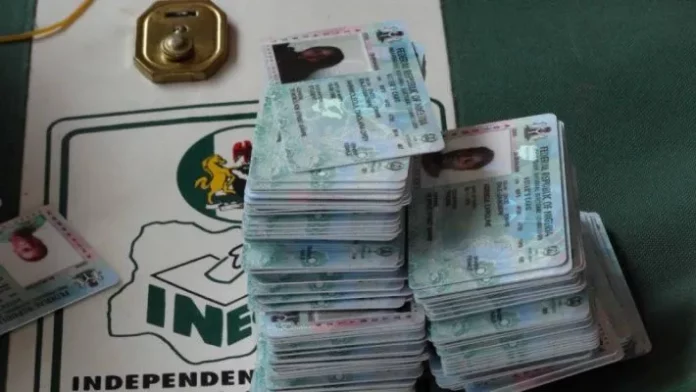THE Independent National Electoral Commission on Wednesday shed more light on why some states were recording low turnout for the collection of Permanent Voter Cards since the commencement of the exercise.

The commission also stated that out of the 93,469,008 registered voters for the 2023 general election, women voters constituted 44,414846 or 48 per cent, while men constituted 49,054162 or 52 per cent.
The youths (18-35) constituted 37,060,399 or 40 per cent.
According to the commission, most of the states with low PVCs collection rates were states where off-season governorship elections were conducted.
INEC National Commissioner and Chairman (Outreach and Partnership Committee), Prof. Kunle Ajayi, stated this in an interview with journalists during the commission’s dialogue with Nigerian Women Groups and Candidates, organized by the International Foundation for Electoral Support with the theme, “2023 general elections: Women’s participation in PVC collection and election day processes”.
He said that apathy towards the collection of the PVCs were only noticeable in states where off-season governorship election took place including Anambra, Ekiti, and Osun States.
Ajayi said a reasonable number of registered voters residing in the listed states had collected their PVCs before the governorship elections were conducted.
The INEC National Commissioner also blamed the ‘culture’ for last-minute rush for the current situation.
He said, “I was in Ekiti state during the Christmas period to monitor collection of people and observed that there was a low turnout and I immediately called the Resident Electoral Commissioner in charge of Ekiti state. He told me what actually happened. You know in Ekiti, we have had an election in 2022 and most people have collected their PVCs before that election.
“So many people have collected their PVCs. I was satisfied with that explanation. And also, the same thing in Osun State. We had an election in 2022 and the majority of people too have collected their PVCs. The same thing will happen in Anambra because they also had their governorship election in November 2021. Then again, Nigerians have this culture. We always wait to the last minute before we respond to issues in anything we do.
“During the Continuous Voter Registration exercise, we appealed to people to come out; they didn’t until the last week, then we had this huge turnout. They started blaming INEC. We have a terrible culture of not coming out and that is why we have started advocating and appealing to everybody not to wait until the last minute.
“However, we envisage that people will still not come out until the last minute and that was why we were proactive in our actions and took a decision that we need to extend the deadline by one week. We are expecting a huge crowd in the last week and we will be able to manage it”.
Speaking on women’s participation in PVC collection and voting, he disclosed that out of the 93,469,008 registered voters for the 2023 general election, women voters constitute 44,414846 or 48 per cent, while the men constitute 49,054162 or 52 percent and the youths (18-35) constitute 37,060,399 or 40 per cent.
By implication, he described Nigerian women as a major power block and a voting force to contend with in the forthcoming general elections.
The INEC commissioner, however, stressed the need for women to translate the data into actual reality and voting force, maintaining that women need to rise above all socioeconomic and political factors militating against them.
“This indeed is a herculean task. But with the power of your PVCs and the opportunity of the coming elections, there Is an avenue for women to change the narrative, speak with a united voice and grasp the mantle of leadership in their favour. It is my belief that the Nigerian women have so much to contribute to the socio-political and economic landscape of Nigeria, that they simply have to hold their rightful position at the helms of affairs of our great country”, he added.
The acting Director (Gender and Inclusivity Department) in INEC, Lakunuya Bello, expressed the commission’s commitment to ensure that the nation’s political landscape will continue to provide a level playing field for the participation of all citizens in the electoral process irrespective of gender.
While expressing concern that insecurity and culture in some parts of the country might contribute to voter apathy, she observed that INEC had put in place measures that would ensure that women are not disenfranchised on election day.
She said, “INEC had identified that where culture would not allow women to come out and mingle with men, they should have the priority to have separate queues and women that are not nursing or elderly people should have priority to come to the front and be able to vote. These are some of the things that could be challenging for women to present themselves to come and vote even having their PVC. And again, of there is violence, they will be challenged but INEC is working in collaboration with the security agencies to ensure that there will be no violence.”

